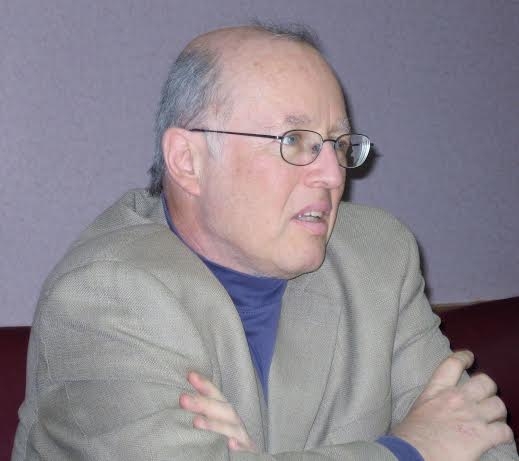Established in 2012, the John Fekete Award recognizes outstanding service to the Trent University Faculty Association, its members, or the academic profession generally. The award honours Professor John Fekete whose 36-year career as a member of the Trent University faculty was marked by extraordinary leadership, lasting achievements, and extensive service to the Union and its affiliates. For more information about criteria, nominations and approval of the award, please refer to its terms of reference.
Award Winners
2016: Rory Coughlan

From 2002, when Rory started at Trent, he was a stalwart and active contributor to TUFA, its members, and the academic profession more generally.
Rory’s well articulated world view influenced every aspect of his career – his teaching, research and service – and made it natural for him to be a strong union advocate. Willing to do the hard work involved to address inequities and injustices as he saw them, both in the purview of TUFA, as well as in terms of wider social and global issues.
Rory served with strength on the TUFA executive in a number of important roles from 2004-5 to 2009-10: two years as Secretary (2004-6), four onerous years as Grievance Committee Chair and Grievance Officer (2006-10), four years on the Trent University Joint Committee for the Administration of the Collective Agreement and on the Accommodations Subcommittee (2006-10), four years attending CAUT and OCUFA meetings on behalf of TUFA, several years on the Negotiations Council, then as a member of the TUFA negotiating team 2008-9 and 2009-10.
Rory also advanced the profession with service outside of TUFA, including three years on the Trent Employment Equity Committee (2005-7, 2011-12), six years (five as chair) on the Trent University Research Ethics Board (2005-2011), four years on the Trent University Research Policy Committee (2010-14).
It is worth pointing out that Rory’s service on these committees concerned employment equity and research, areas that impact substantially on the well-being of TUFA members and the profession.
During his years at Trent, Rory rendered outstanding service to TUFA and its members, “advancing the cause of collective bargaining … contributing to the governance and internal development of the association” (terms of reference for the award).
Rory was a strong ally and advocate to have on our side. Rory was uniquely larger than life, a natural leader who knew his own mind and advocated tirelessly to benefit his TUFA colleagues, his undergraduate and graduate students, those in the wider Peterborough community with whom he worked, and the profession in general.
It is an honour to nominate Rory Coughlan for the John Fekete Award.
2016: Janice Millard
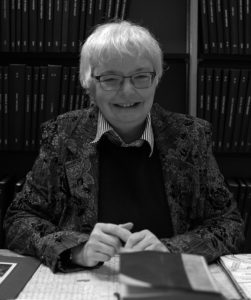 Over the course of her 40-year career at Trent, Janice Millard served the Association in a variety of capacities, most notably as a member of the Executive Committee, as a grievance officer, representing librarians on Negotiations Council, and as a member of the Bargaining Team that negotiated the 1999-2002 Collective Agreement. Janice also served the Association on a variety of subcommittee’s dealing with such things as: shared governance at Trent, faculty intellectual property rights, employee benefits, and the internal operation of TUFA itself. Janice was extremely engaged as a professional in service to the University and to the broader community, receiving several civic awards from the province as well as from the city of Peterborough.
Over the course of her 40-year career at Trent, Janice Millard served the Association in a variety of capacities, most notably as a member of the Executive Committee, as a grievance officer, representing librarians on Negotiations Council, and as a member of the Bargaining Team that negotiated the 1999-2002 Collective Agreement. Janice also served the Association on a variety of subcommittee’s dealing with such things as: shared governance at Trent, faculty intellectual property rights, employee benefits, and the internal operation of TUFA itself. Janice was extremely engaged as a professional in service to the University and to the broader community, receiving several civic awards from the province as well as from the city of Peterborough.
2015: John Gilchrist and Bernard (Bernie) Hodgson
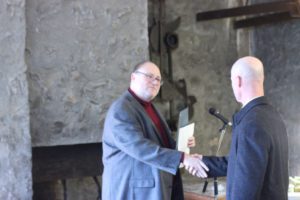
John Gilchrist
Professor Gilchrist was a serious historian of note, which strengthened his voice and confidence, and he was a respected and well-connected leader. As TUFA President, he led TUFA’s first strike in 1991, ten years after certification, making it clear that the faculty were prepared to respect their own professional status, claim parity with other academics, and put themselves at risk to back up their position, for the benefit of both the faculty and the university. The strike was successful and made great gains in moving toward parity in practice, and left an indelible mark on the psychology of the association as a union, and on the culture of the university which had to take collective bargaining seriously. Professor Gilchrist unfortunately passed away not long thereafter.
When John assumed the presidency of TUFA at the end of the 1980s, Trent faculty were still dead last in the list of Ontario-average professorial salaries, and the association was well embarked on the long quest to convince the world that the pension plan was to be administered for the benefit of its members. John was intimately involved in that quest. More remarkable was his achievement, as an elderly and seldom uncontroversial firebrand, of near-unanimity among his colleagues about the necessity, after months of inconclusive talk, of striking for the principle of parity. As we now know, it took two strikes to implement the principle, but it was under John’s leadership that the faculty remained united through several very uncomfortable weeks and convinced the Board of Governors to accept the principle.
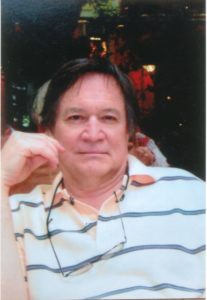
Bernard Hodgson
Professor Hodgson was President of TUFA in 1984 when parity was first raised in a negotiation under his leadership. The issue was not won at that time and faculty were not ready to strike for it. He remained active in all facets of TUFA, served as a member of the Executive and in other capacities, and was always a player in meetings and policy formulation, in TUFA and in the University. During the second strike of 1996, Hodgson was Vice-President of TUFA, tasked with organizing the field operations of the labour action. His service was indispensable to the success of the strike, which turned out to be our most important collective action to date, where parity was finally won in practice and in principle, and the commitment to decent pensions was consolidated.
Bernie and I were picket captains during the [first] strike. I have a vivid memory of arriving for duty at the entrance to the campus just before 7 a.m. on the first day, wondering whether I might be the first person at Trent to be a striker. But Bernie was there already, so the record presumably belongs to him. I recall that he was much exercised by having received a phone call from another picket captain who had advised his picket team to show up when it stopped snowing. Bernie’s logical and moral sense was invariably acute, but nobody could ever have accused him of being a softie.
2014: Graham Cogley, Doug Curtis, David Kettler and George Nader

Graham Cogley first served on the executive in 1979 and numerous other times during his career (twice as Vice-President, for five years as Secretary, four years as Grievance Officer, and eight years on the Grievance Conciliation Panel). He has served on the negotiating teams four times, in addition to the negotiations board and negotiations council. He also served as the director of communications, the editor of the TUFA Times and as picket captain in 1992.
In his service to the union, Graham “has contributed to the quality of life for every TUFA member, their families and the wider Trent community, rendering service to the academic profession generally by helping to maintain standards and expectations for the working lives of the professoriate.
It is worth pointing out that Graham’s contributions have been in areas that impact substantially on the well-being of the members. He has served on committees dealing with the Policy on Harassment and Discrimination, Policy on Scholarly Misconduct, Anomalies Review, Academic Personnel, and twice with the onerous, but vital, issues of Pensions and Retirement Benefits.
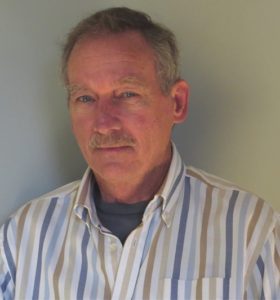
Douglas Curtis joined the Department of Economics at Trent University in 1970. Prior to coming to Trent he held a faculty appointment at Waterloo Lutheran University (Wilfred Laurier University) and a Research Officer appointment at the Dominion Bureau of Statistics (Statistics Canada). He served as Chair of the Department of Economics at Trent from 1977 to 1987, was Visiting Scholar at Cambridge University (1980-81) and Visiting Professor in Economics and at the Institute for Economic and Social Research at the University of York (1987-88). From 2003 until 2013 he was also Adjunct Professor in the Department of Economics at Queen’s University.
His teaching and research interests are focused on Macroeconomic Theory and Policy: more specifically the theoretical and empirical aspects of fluctuations in national economic output and growth, employment and inflation, and the design and evaluation of monetary and fiscal policies.
Professor Curtis took an active role in the faculty association at Trent. From 1985 until retirement in 2007 he served several terms on the executive of the Trent University Faculty Association (TUFA,) as a TUFA representative on Pension and Investment Advisory Committees of the Board of Governors and as a member of the many negotiating committees on TUFA collective agreements and pension plans.
His commitment to research and undergraduate teaching continues in retirement. Professor Curtis and Professor Ian Irvine of Concordia University are joint authors of a completely free on-line Creative-Commons governed pair of introductory texts in Economics, accompanied by free power points and question bank. Maintaining the theoretical, policy and empirical currency of these texts in the continuing aftermath of the 2008 financial crisis is a continuous process of revision and update, academic term by term. However, that does leave some time to enjoy the ownership and management of a small forest and off-grid cabin at an undisclosed location in the County of Frontenac.

David Kettler was born in Leipzig, Germany in 1930. Since 1990, he has been Research Professor in Social Studies at Bard College (New York) and Professor Emeritus in Political and Cultural Studies at Trent University (Ontario). In addition to his service on numerous Trent committees during his 20 years as professor, he was the first Chair of TUFA, during the two years of certifying the union and negotiating the first collective agreement. Kettler was awarded a Faculty Research Award the first time that this was allocated to the Social Sciences. He came to Trent after 15 years at Ohio State University, from Instructor to Full Professor.
He is author or editor of seventeen books and many scholarly articles. The common theme of most of his work has been the relations between ideology and political theory in the writings of intellectuals, with emphasis on the Scottish Enlightenment and Weimar political culture. His studies of Adam Ferguson and Karl Mannheim are standard works. He has also published a book and several articles dealing with the politics of labor law in Canada and the United States. In recent years, Kettler headed a research project on Weimar intellectuals in exile, which yielded five edited volumes.
His most recent book publications are: Karl Mannheim and the Legacy of Max Weber. Retrieving a Research Programme. With Colin Loader and Volker Meja. Aldershot, England: Ashgate, 2008; The Liquidation of Exile. London: Anthem, 2011; Detlef Garz and David Kettler, eds. Nach dem Krieg! – Nach dem Exil? Erste Briefe/First Letters, co-editor (with Detlef Garz). Munich: text+kritik, 2012

George Nader served as President of TUFA for two years (1985 and 1986), and as member of the TUFA Executive for seven years (1983-88; 1995-97). He negotiated for the collective agreement four times (1984, 1986, 1987, and 1996), new pension plans during two demanding periods which resulted in the creation of the SRA benefit (1997-99) and which instituted the new ARA funding arrangements (2005-06). He represented TUFA at a salary arbitration in 1985, and at a pension arbitration in 1988.
George helped conceive, develop, and negotiate important benefits such as salary parity, upgrading the salaries of junior faculty, improvements to pension benefits which including establishing the ownership of the pension surplus and the SRA benefit.
He was a member of OCUFA’s Executive (1985-87), its Treasurer (1986-87), and a member of the OCUFA Board (1985-88). He was also a member of CAUT’s Council (1984-88), Defence Committee (1984-86), and Nominating Committee (1987-88).
Highly regarded as an eminent collective bargaining activist, George’s reputation was acknowledged in repeated invitations to speak at provincial and national venues: at OCUFA’s salary and benefits workshops (1987, 1995); at OCUFA’s pension workshops (1988, 1990, 1992, 2000); as well as at the CAUT Collective Bargaining Conference (1986) and the CAUT pension workshop (1989).

